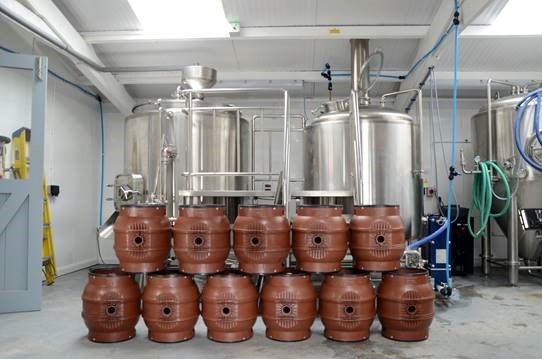Award winning breeders of rare cattle and green entrepreneurs Richard and Alison Bunning wanted to start a new business at their Devon farm where they had lived for almost 20 years. An old block-built cow shed was screaming to be converted, but what would they decide to do as their next business venture on their farm near Tiverton?
For almost 20 years, Richard and Alison Bunning have lived on a 40-acre farm in environmental stewardship, breeding award winning rare breed cattle. They had a redundant 60s blockwork cowshed on the farm, available for a diversification project so on finding out about the LEADER programme offering 40% grants to capital costs and having a small inheritance lump sum, Richard decided to follow his dream, and converted the building into a brewery!
The Bunning family run a group of various small family businesses on the farm near Tiverton in Devon, each with its own needs. Their herd of rare breed Galloway cattle has won numerous classes in shows across the South West and they have attracted interest from Europe and as far afield as New Zealand in their breeding stock.
Their green credentials are impressive with their environmental management at the farm resulting in a substantial increase in wildlife and a sizeable part of the farm is now a designated Devon County Wildlife Site. Early renewable energy investment in biomass heating and solar power on the barn roofs and their borehole water treatment plant has paid huge dividends, helping them to reach carbon zero very early on in the battle against climate change.
Keen to diversify further and become a brewer of fine ale, John started the conversion on the old building, designed by his partner Alison Bunning (RIBA) installed a 1,000 litre brewhouse, sourced and shipped from China and embarked on his latest business adventure. The project involved getting planning permission, change of use for the building, HMRC registration as a brewer, alcohol licensing to produce and sell beer, food hygiene approval, brewery operation registration and documented quality management procedures, fire certification etc etc. A real family enterprise, Richard’s son, previously a manager at Wetherspoons, went on the Master Brewer course and qualified to start the brewing.
The family researched the market, ran numerous 30 litre test brews to choose a recipe and brought the facility up to full readiness to start trading. Their first small batch of sample beer was used to test the market reaction, and it was extremely favourable. Richard said, ‘the people we invited to taste the beer said it was “very drinkable”, “more-ish” and had a “great flavour” which was all hugely encouraging’.
Then in spring 2019 Covid hit, resulting in their carefully crafted five-year cashflow plan, the marketing plan, and the ongoing investment to expand capacity all going swiftly out of the window. Their market vanished almost overnight as the pubs locked down.
Richard and Alison heard about the HoTSW Growth Hub from being members of the NFU and active in cattle societies, as well as having a presence in architectural practice. Richard used the HoTSW growth hub to access a consultant and get some neutral advice about the way forward for the new business. Via Zoom, a HoTSW consultant offered Richard a way to rethink his new business. He identified any problems and helped the family to work together to evolve their thinking, both as partners and as individuals, to produce a forward plan, and come up with a plan on how to turn this into an effective action strategy. One major change was bringing forward their plan to bottle beer by two years, because their planned route to market via pubs in 9-gallon firkin barrels was on hold due to the lockdown, they were able to talk through the steps needed to do this and get help in creating the right labelling and a marketing strategy.
Richard said, ‘We faced the wreckage of the Covid pandemic and subsequent lockdowns, which was debilitating and deeply disappointing and had to completely rethink our business strategy. Coming in as a neutral advisor, the HoTSW consultant offered us a way to rethink the new business, without the risk of disagreements causing friction between us. He identified the problems, and helped us work together to evolve our thinking, both as partners and as individuals. He helped us to produce a model of the way forward, and how to turn this into an effective action plan. For example, we decided that the bottle labelling needed to be rethought to beef up its impact on consumers. We also sorted out the more mundane issues of crates, EPOS transactions and transport to enable us to service this alternative route to market.’
‘Sand Martin Ale’ is named after a new sand martin colony on the riverbank only 50 metres away from the brewery and will be officially launched at the Mid Devon Show at the end of July.
Richard and Alison are also exploring the prospect of “cuckoo brewing”, where other brewers could use their brewery to produce their ales, improving the efficient use of the investment in the brewery.
Twitter/Facebook: @hatherland
Instagram: @hatherlandbrewery
![]()



